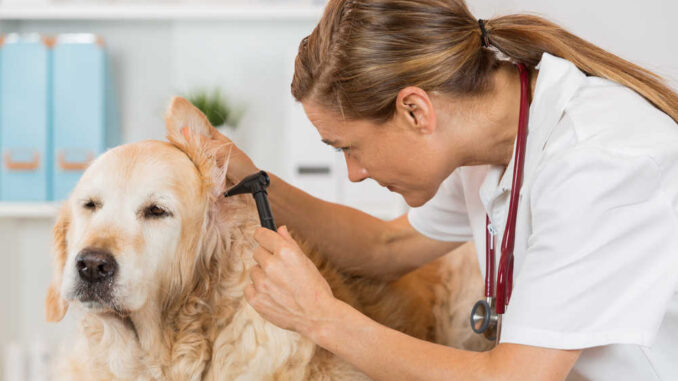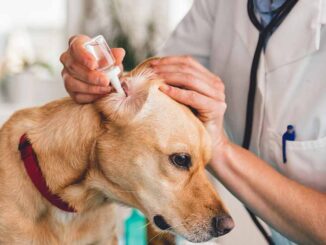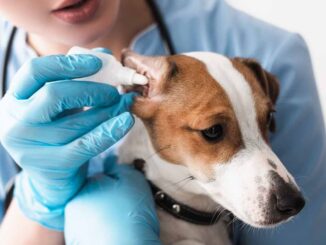
This article was updated on May 2nd, 2023
If your dog is scratching their ears or shaking their head, they may be bothered by an ear infection. Skin and ear infections are one of the most common reasons that pet parents bring their dogs to the vet. This issue is often caused by an underlying allergy, and requires veterinary expertise to diagnose and treat appropriately. Not only are ear infections uncomfortable for your dog, they can become quite serious if left untreated. Most cases can easily be managed by your vet, but is there anything you can do at home to help treat an ear infection? In this article we will review the best home remedies for your dog’s ear infection, and describe when it’s ok to try home remedies and when you should NOT delay veterinary care.
What NOT to Do
First, let’s review home remedies that are NOT recommended (even though many blogs tout them as an effective and natural solution). Never put anything into your dog’s ear that has not been recommended or approved by your veterinarian. Not only do these products fail to treat ear infections, they can actually cause your dog additional pain and irritation, and lead to significant and permanent damage if your dog has a ruptured eardrum.
- Hydrogen peroxide – Not only will this product cause uncomfortable bubbling, it will leave water behind in the ear canals, which can further promote growth of yeast and bacteria.
- Apple cider vinegar – This product will also create a moist environment promoting additional infection.
- Olive oil or essential oils – While theorized to break down wax, olive oil contains no antibacterial properties and will create a moist environment in the ears. Never put essential oils in your dog’s ears, as many can be toxic to pets.
- Rubbing alcohol – This product will cause painful irritation to your dog’s already tender ear canals.
- Ear medication left over from a previous ear infection or from another pet – If your pet has a ruptured ear drum some topical medications can cause significant damage, including hearing loss. Furthermore, the medication that you have at home may not be effective for your pet’s current ear infection, and you may not have enough to complete a full course of treatment. If you have leftover medications let your vet know so that they can decide if this may be an appropriate course of treatment.
When It’s Ok to Try Home Remedies to Treat a Dog Ear Infection
If an ear infection appears mild or you caught it very early, you may try cleaning your dog’s ears at home. However, in most cases, an ear infection will not resolve and may worsen without veterinary treatment. If you notice these signs below, do not attempt at-home treatment and schedule an appointment with your vet right away:
- Your dog is painful
- There is blood or purulent (pus) discharge in your dog’s ear
- Your dog is tilting their head, leaning, or falling to one side
- Your dog has developed an ear hematoma (blood-filled swelling of the ear flap)
Home Remedies You Can Try To Treat a Dog Ear Infection
To help treat mild ear infections or while you are waiting to get an appointment with your vet, you may try the following at home. Note that these treatments may NOT be effective in the late stages of an ear infection, and should not delay veterinary care.
1. Clean your dog’s ears
If an ear infection is mild or in the early stages, an ear cleaning may help clear the infection. There are many ear cleaners available, which can be purchased from your vet, a pet store, or online. It is always best to ask your vet for advice when choosing an ear cleaner in case they have a specific recommendation in mind, however, the following products are also good choices. Ears may be cleaned daily for one week and then weekly as needed, or as directed by your vet.
Vet Recommended Ear Cleaners
Virbac EPIOTIC Advanced Ear Cleaner
Why we like this product: It is safe to use for many different ear issues and even for sensitive ears. This formula helps to soften and remove excess earwax, hair, and debris and it dries the ear canal to prevent further growth of yeast or bacteria.
Cons: It’s a bit more expensive than other brands and may cause irritation in some dogs.
ZYMOX Ear Cleanser – 4 oz. Bottle
- Cat and dog ear cleaner – quickly and effectively clean non-infected ears in pets of all ages
Why we like this product: It’s safe to use as a regular cleaner for healthy ears. It’s non-toxic and doesn’t contain any harsh ingredients.
Cons: This is for regular cleaning of healthy ears only. It may cause irritation in some dogs.
Burt’s Bees Natural Ear Cleaner
- DOG SKIN VS. HUMAN SKIN - Dogs' skin has a higher pH, so human skincare products can be harmful. This dog ear cleaner is specially pH balanced for dogs, reducing chances for additional irritation
Why we like this product: This is a gentle, yet effective ear cleaner for all types of ears. It contains all-natural ingredients to help soothe as well as clean.
Cons: The essential oils can be a little irritating, so be sure to remove as much of the cleaner as possible with a paper towel or cotton ball.
Nutri-Vet Ear Cleanse for Dogs
- EAR CLEANER LIQUID SOLUTION FOR DOGS: Our dog ear cleaner is a veterinarian-formulated ear wash for dogs designed to gently clean and deodorize your dog’s ear canals and flaps, removing dirt, wax, and other material
Why we like this product: This ear cleaner can help relieve itching related to allergies, eczema and other skin condition as well as clean the ear.
Cons: It may cause irritation.
For dogs with ear infections, try the following ear cleaning solutions:
Pet MD Veterinary Tris Flush Cat & Dog Ear Cleaner
- While Other Dog Ear Drops Solutions Are Too Harsh For Your Furry Friends, Leading To Allergic Reactions Or Worse, Pet MD’s Mild, Non-stinging Tris Flush Ear Cleaner For Dogs & Cats Was Specially Formulated To Be Gentle But Effective, Flushing Out Nasty Infections From Your Dog Ears, Eliminating The Root Cause Of Your Dog Ear Infection.
Why we like this product: It contains ketoconazole which is an antifungal to target yeast infections.
Cons: It may cause irritation.
Veterinary Formula Clinical Care Ear Therapy
- HELPS ALLEVIATE – This dog and cat ear cleaner was formulated with properties to help promote healthy ear canals. Rinse pet's ears daily with solution and massage area.
Why we like this product: It contains medication to help relieve bacterial and fungal ear infections, yet is gentle enough for sensitive ears.
Cons: It may cause irritation and the medication isn’t necessary for routine ear cleaning.
Always make sure to have your dog’s ear infection diagnosed by a veterinarian before choosing a medicated ear cleaner.
You can also read our guide to dog ear cleaning for more tips and product recommendations on how to clean your dog’s ears.
2. Prevent additional damage
You can help prevent your dog from further scratching and injuring their ears by putting them in a cone and keeping their nails trimmed.
3. Remove excess hair from the ear canal
Certain breeds are predisposed to having excess hair in their ear canals, which can trap moisture and debris leading to infection. Keeping these long hairs plucked can help prevent ear infections in some dogs. You can have this done by a groomer or learn to do it yourself at home. However, if your dog has an active ear infection, it is best not to attempt this procedure as it can be too painful.
4. Manage underlying allergies
Recurrent ear infections are often a symptom of underlying allergies, which can also cause itchy skin and skin infections. If your dog has had multiple ear infections in the past, discuss options for managing allergies with your vet. Depending on what your dog is allergic to this may include year-round flea prevention, feeding a hypoallergenic diet, and/or using medications such as Cytopoint and Apoquel to help decrease allergy symptoms and frequency of infection. Over-the-counter options such as Benadryl and omega-3 fatty acids may be beneficial in mild cases.
The Importance of Veterinary Treatment
It is always recommended to consult with your veterinarian if you suspect that your dog has an ear infection. This is because an ear infection can get worse over time and cause pain and discomfort for your pup. The resultant inflammation and infection can affect the middle or inner ear, damage the ear drum, alter their balance and hearing, and lead to formation of scar tissue.
When to See a Vet
If your dog’s mild ear infection is not improving with cleaning at home or if you feel that your dog is painful, see blood or purulent discharge coming from their ear, or notice that their hearing or balance seems off, you should schedule an appointment with your vet.
Other issues, such as mites and foreign bodies in the ear, can cause similar symptoms and should be ruled out by your vet.
How are Dog Ear Infections Treated at the Vet?
A veterinary appointment to assess your dog’s ears will likely include the following:
- Thorough history
- Nose-to-tail physical exam – A full physical exam is completed at every veterinary appointment. As skin and ear infections often go hand-in-hand, your vet will also thoroughly examine your dog for any signs of pruritus (itchy skin) and infection.
- Otoscopic exam – If your dog tolerates it, your vet will use an otoscope to evaluate their ear canal and eardrum. They will also be able to check for the presence of any foreign bodies (like fox tails or other plant materials) or masses in the ears. Making sure the eardrum is intact and not ruptured is important in determining the best way to safely treat the infection.
- Ear cytology – Taking a sample of debris from your dog’s ear for examination under the microscope can help your vet diagnose an ear infection, as well as determine if it is caused by yeast, bacteria, or a combination of both. This allows them to pick the best medication to help treat the infection.
- Ear cleaning – Cleaning out the wax and debris from the ear is important so that topical medications can get deeper into the ear and treat the infection effectively.
- Prescribing appropriate medications – Based on exam, ear cytology, and owner preference, your vet will pick an appropriate treatment plan.
- Demonstration of how to clean and apply medication to your dog’s ears at home if indicated.
- If your dog has had recurrent or chronic ear infections your vet will likely discuss underlying allergies and what can be done to manage them to help prevent more infections in the future.
The type of medications used to treat ear infections vary based on the causative agent of your dog’s ear infection (bacteria, yeast, or both), the severity of the infection, your dog’s tolerance for having their ears handled, and owner preference. Treatment usually involves a combination of topical antibiotics, antifungals, and anti-inflammatory medications. Your vet may send home ear cleaner and ointment/drops for you to apply once or twice a day at home, or they may instill a longer-acting medication into your dog’s ears at the vet clinic. In some cases, oral medications will be needed as well. If your dog’s eardrum has ruptured some topical medications may not be safe.
What are the Results and the Costs?
The cost of treatment for an ear infections can vary depending on where you live and how bad your dog’s ears are. Typical costs range from $200 to $700. Your vet can give you an estimate with a breakdown of the cost of treatment before they start treating your dog’s ears.
How Long is the Treatment?
Your vet will provide detailed instructions on how long to treat your dog’s ears for at home. Often ears should be cleaned daily for one week, then weekly as needed. Ear medication is usually applied once or twice daily for 10-14 days. If you opt for a long-acting topical medication you will not have to treat your dog’s ears at home. You should start noticing improvement within the first few days of treatment. Your vet may want to recheck your dog and repeat an ear cytology after you finish the medications, to make sure that the infection has fully resolved.
How Do I Know if My Dog Has an Ear Infection?
Ear infections may affect one or both ears. The most common clinical signs of ear infections in dogs include:
- Head shaking
- Scratching or rubbing at the ear(s)
- Excess debris (black, brown, purulent) inside the ear(s)
- Foul odor from the ear(s)
- Red, swollen, ear canal(s)
- Scabbing or crusting around the ear(s)
- Painful ear(s) when touched
- Tilting head to the side or holding ear(s) in an abnormal way
If your dog shakes their head but their ears are clean, you can read our article from Dr. Ellen Russell: Dog Shaking Head But Ears are Clean?
Disclaimer: This website's content is not a substitute for veterinary care. Always consult with your veterinarian for healthcare decisions. Read More.











Be the first to comment